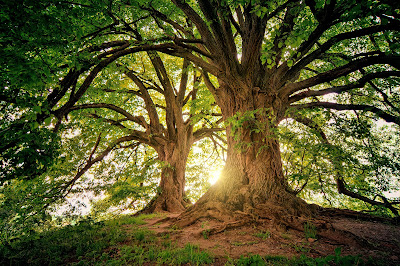To
Bake the Bread
(“Seize life! Eat bread with gusto, drink
wine with a robust heart. Oh yes—God takes pleasure in
your
pleasure!” Ecclesiastes 9:7 [The Message])
I saw you come in from the fields,
covered with wheat dust and dirt.
I saw your face burnt from the relentless sun,
and saw your hands roughened by the twine on the
rows of bales thrown on the back of the truck.
I saw you come in.
The crop was late this year, a cold spell mid spring
slowed everything down. And now some may not take
the sunflowers off until February after they are frozen and
dry.
But today, late in the evening, we would break bread;
we would
throw our stories around like fast pitches at a pick-up baseball game.
We would kid the children who sat in the cab with us. We would thank
the women and teens who brought our lunch to us. We would drink
deeply of water to clear the dust from our parching throats. And
(out of courtesy) we laid our over-hauls in the mud room. We would be
back at it in the morning.
So, with dirt scrubbed hands we passed around the
meal. The bread
was there in abundance; hot rolls, banana bread, whole loaves that smelled
like they were still baking. We ate deep (the children ate quick), we ate but
stopped between one chew and the next to playfully thank our host and ask,
“Do you bake all day, so you don’t have to come to the fields?” It’s harmless.
Because mostly they do frequent the fields, pulling double duty: guide the
combines and back to bake the bread.
And tonight, though not the finest wine, the color
came back to our cheeks
with each glass. Grandma sipped slowly but was the first one up from the table.
She had a plan, she had a spark, she had an itch to make our simple meal a
party.
The crops were nearly in…except for the late sunflowers…and it was time
to celebrate.
She put on a record full of standards from the 40s.
The kids and teens groaned,
and honestly, so did some of the adults. But granny knew what we did not,
there is no better dance music than big band music. “In the Mood”, “It Don’t
Mean a Thing (If it Ain’t God that Swing)” The toddlers took to twirling first.
They kept their socks on as they slid across the
smooth hardwood floor
surrounded by couches, recliners, and side tables. They spun like dervishes,
and giggled like dolphins showing off.
First dad, then uncle, then cousins and teenage
relatives, took one of the
skating toddlers and spun them round to the music. The giggles hit the rafters
and ricocheted back into the room.
Granny and Grandpa were the next up. He took her in
his arms like a schoolboy
at prom. Their eyes gleamed. They had waited out the day to eat of the bounty,
and now wanted to celebrate free of restraint.
Everybody in between, after they stopped their complaints,
found a way to keep time
to these tunes from another century. And then, just as every was losing their
breath,
Grandpa pulled out his fiddle, and Mama pulled out her guitar, and they played
bluegrass, and reels, and jigs. The same songs they always played. Their
repertoire was short, but their execution was precise.
Good food, abundant wine, dancing like there would be
tomorrow to do it all over again,
all seemed the most appropriate way to say
Thank You
For a harvest, a hard harvest, that was now nearly in.
If they could, they would
have wiped the plates clean, depleted the wine, and danced all night laughing
with
the children, some of whom had already fallen asleep on the floor and couches.






















